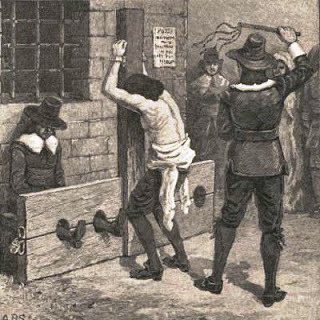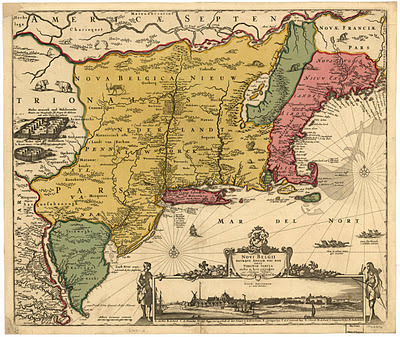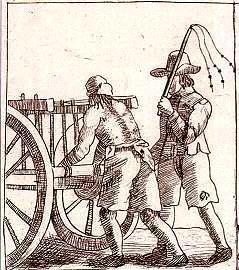They delight to be persecuted
© Christy K. Robinson
 "Blessed are theywhich are persecuted for
"Blessed are theywhich are persecuted for
righteousness' sake: for theirs is the kingdom ofheaven. Blessed are ye,when men shall revile you,
and persecute you, and shall say
all manner of evilagainst you falsely, for my sake."
~Jesus Christ, the Beattitudes
If the Quaker missionaries of the 1650s were so harshly and frequentlypersecuted in New England, Maryland,and Virginia, but had refuge in Rhode Island, why did they not stay safe and secure in Rhode Island?
Theyweren't particularly desired in Rhode Island, and Roger Williams and the Baptist leadershipsometimes called their doctrines pernicious, dangerous, and damaging. Rhode Island,as codified in their charters, believed strongly in the separation of civil andecclesiastical powers—or what we'd call separation of church and state. Thishad come from Rev. Roger Williams, Dr. John Clarke, and the large group ofMassachusetts Bay pioneers who were banished from Boston in 1638, including Anne and WilliamHutchinson and William and Mary Dyer.
Massachusetts Bay colonyhad been founded on the dream that it would be a sanctuary and beacon of lightin the darkness of corrupt European religion. It would be the pure New Jerusalem, they hoped,a fulfillment of Bible prophecy. The ministers and magistrates ruled the GeneralCourt, basing their laws on the Bible's Old Testament. And they were the ones who received and interpreted revelation from theBible, not cursed, weak-minded women like Anne Hutchinson and Mary Dyer.
Not quite 20 years had passed since the big AntinomianControversy when the Friends, called Quakers in a derogatory way because oftheir shaking with passion or ecstasy when in communion with the Holy Spirit,entered New England with the intent of sharingtheir beliefs and gaining adherents. In 1655-1657, more and more English Quakersshowed up in Massachusetts and Connecticut, where theywere not the peace-loving, contemplative, silent types that we think of: theydisrupted church services, preached concepts heretical to the puritans, refusedto pay their taxes/tithes, and even, in a few cases, bared their breasts toshow their innocence before God. (This may have been a contributing factor tostripping men and women to the waistfor public whippings. It gave them scars which proved they were guilty criminals.)
 1685—Dutch map of New England (click to enlarge)The United Colonies of New Haven, Connecticut, Plymouth,and Massachusetts Bay (but mostly the Bay leaders in Boston)wrote a letter in September 1657 to Rhode Island's assembly, urging them to treat the Quakersin a way consistent with the other colonies, and to not grant refuge to theQuakers. (At this time, Mary Dyer had experienced her first imprisonment in Boston, and had been rescued and brought home to Newport by her husband, a well-known Rhode Island attorney general and admiral ofthe United Colonies.)
1685—Dutch map of New England (click to enlarge)The United Colonies of New Haven, Connecticut, Plymouth,and Massachusetts Bay (but mostly the Bay leaders in Boston)wrote a letter in September 1657 to Rhode Island's assembly, urging them to treat the Quakersin a way consistent with the other colonies, and to not grant refuge to theQuakers. (At this time, Mary Dyer had experienced her first imprisonment in Boston, and had been rescued and brought home to Newport by her husband, a well-known Rhode Island attorney general and admiral ofthe United Colonies.)
GENTLEMEN,—Wesuppose you have understood that the last year a company of Quakers arrived atBoston, upon no other account than to disperse their pernicious opinions, hadthey not been prevented by the prudent care of the government, who by that experiencethey had of them, being sensible of the danger that might befall the Christianreligion here professed, by suffering such to be received or continued in thecountry, presented the same unto the Commissioners at their meeting atPlymouth; who, upon that occasion, commended it to the general courts of theUnited Colonies, that all Quakers,Ranters, and such notorious heretics, might be prohibited coming among us; andthat if such should arise from among ourselves, speedy care might be taken toremove them; (and as we are informed) the several jurisdictions have madeprovision accordingly; but it is by experience found that means will fallshort without further care by reason of your admission and receiving of such,from where they may have opportunity to creep in among us, or means to infuseand spread their accursed tenets to the great trouble of the colonies, if notto the professed in them; notwithstanding any care that has been previouslytaken to prevent the same; whereof we cannot but be very sensible and think no care too great to preserve us from sucha pest, the contagion whereof (if received) within your colony, weredangerous to be diffused to the others by means of the intercourse, especially to the places of trade among us;which we desire may be with safety continued between us [threat to disrupttrade and passage through their lands]; we therefore make it our request,that you as the rest of the colonies, take such order herein that yourneighbors may be freed from that danger. That you remove these Quakers that have been received, and for the futureprohibit their coming among you; whereunto the rule of charity toyourselves and us (we conceive), doth oblige you; wherein if you should we hopeyou will not be wanting; yet we could not but signify this our desire; andfurther declare, that we apprehend thatit will be our duty seriously to consider, what provision God may call us tomake to prevent the aforesaid mischief [another threat]; and for our furtherguidance and direction herein, we desire you to impart your mind and resolutionto the General Court of Massachusetts, which assembles the 14th of Octobernext. We have not further to trouble you at present, but to assure you wedesire to continue your loving friends and neighbors, the Commissioners of theUnited Colonies."
The Rhode Island General Assembly answered the lettershortly thereafter, claiming that separation of religious and civil powers waseven more important to them than getting rid of those "pernicious" Quakers.
Sir,this is our earnest and present request unto you in this matter, as you mayperceive in our answer to the United Colonies, that we fly, as to our refuge inall civil respects, to his highness and honorable council, as not being subject to any others in matters of our civil state;so may it please you to have an eye and ear open, in case our adversariesshould seek to undermine us in our privileges granted unto us, and to plead ourcase in such sort as we may not becompelled to exercise any civil power over men's consciences, so long ashuman orders, in point of civility, are not corrupted and violated, which ourneighbors about us do frequently practice, whereof many of us have largeexperience, and do judge it to be no less than a point of absolute cruelty. [In other words, "We know firsthand of your cruelty."]
And further, the Rhode Island Assembly poked Massachusetts Gov. John Endecott in the belly by sayingthat the Quakers had too much peace and prosperity in Rhode Island, and couldn't get convertsto their faith by speechifying—only by being persecuted, which is why thoseQuakers kept going back to puritan jurisdictions and inviting trouble! Rhode Islandclearly implied that if the puritans would just leave the Quakers alone, therewould be no trouble at all. Massachusetts Bay Colony would strip
Massachusetts Bay Colony would strip
Quaker men and women to the waist,
and tie them to a wagon, whipping them
ten lashes in three different towns
before expelling them. If it was winter,
it made no difference to them.
Muchhonored gentlemen. …Andas concerning these Quakers (so called) which are now among us, we have no lawamong us whereby to punish any for only declaring by words, &c. their mindsand understandings concerning the things and ways of God… And we find that in those places where thesepeople … are most suffered to declare themselves freely, and are only opposedby arguments in discourse, there they least of all desire to come, and weare informed that they begin to loaththis place, for that they are not opposed by the civil authority… they delightto be persecuted by civil powers, and when they are so, they are like togain more adherents by the conceit of their patient sufferings, than by consentto their pernicious sayings.
Simply put, the persecution of Quakers was driving interest in their faith and their ability to patiently endure suffering. Practically every puritan and Quaker knew their Bibles well enough to see a fulfillment of Revelation 3:9-11. "And watch as I take those who call themselves truebelievers but are nothing of the kind, pretenders whose true membership is inthe club of Satan—watch as I strip off their pretensions and they're forced toacknowledge it's you that I've loved. Becauseyou kept my Word in passionate patience, I'll keep you safe in the time oftesting that will be here soon, and all over the earth, every man, woman, andchild put to the test. I'm on my way; I'll be there soon. Keep a tight grip onwhat you have so no one distracts you and steals your crown."
Of course, it was never as simple as I've made out here.Religion was not a lifestyle choice, or even a temporal, bodily life and death matter in the 17thcentury. It was a matter of a soul's eternal life versus perishing in the firesof hell.
Still, I admire the way the Rhode Islanders stood strong onthe principle of liberty of conscience, and even if some of them disapproved ofQuakers or Jews or Baptists, it was more important both to their personal honor and to their immortal souls, to uphold freedom for all,than to cave in to the threat of trade or travel restrictions, or bowing to thewishes of intolerant religionists.
 "Blessed are theywhich are persecuted for
"Blessed are theywhich are persecuted for righteousness' sake: for theirs is the kingdom ofheaven. Blessed are ye,when men shall revile you,
and persecute you, and shall say
all manner of evilagainst you falsely, for my sake."
~Jesus Christ, the Beattitudes
If the Quaker missionaries of the 1650s were so harshly and frequentlypersecuted in New England, Maryland,and Virginia, but had refuge in Rhode Island, why did they not stay safe and secure in Rhode Island?
Theyweren't particularly desired in Rhode Island, and Roger Williams and the Baptist leadershipsometimes called their doctrines pernicious, dangerous, and damaging. Rhode Island,as codified in their charters, believed strongly in the separation of civil andecclesiastical powers—or what we'd call separation of church and state. Thishad come from Rev. Roger Williams, Dr. John Clarke, and the large group ofMassachusetts Bay pioneers who were banished from Boston in 1638, including Anne and WilliamHutchinson and William and Mary Dyer.
Massachusetts Bay colonyhad been founded on the dream that it would be a sanctuary and beacon of lightin the darkness of corrupt European religion. It would be the pure New Jerusalem, they hoped,a fulfillment of Bible prophecy. The ministers and magistrates ruled the GeneralCourt, basing their laws on the Bible's Old Testament. And they were the ones who received and interpreted revelation from theBible, not cursed, weak-minded women like Anne Hutchinson and Mary Dyer.
Not quite 20 years had passed since the big AntinomianControversy when the Friends, called Quakers in a derogatory way because oftheir shaking with passion or ecstasy when in communion with the Holy Spirit,entered New England with the intent of sharingtheir beliefs and gaining adherents. In 1655-1657, more and more English Quakersshowed up in Massachusetts and Connecticut, where theywere not the peace-loving, contemplative, silent types that we think of: theydisrupted church services, preached concepts heretical to the puritans, refusedto pay their taxes/tithes, and even, in a few cases, bared their breasts toshow their innocence before God. (This may have been a contributing factor tostripping men and women to the waistfor public whippings. It gave them scars which proved they were guilty criminals.)
 1685—Dutch map of New England (click to enlarge)The United Colonies of New Haven, Connecticut, Plymouth,and Massachusetts Bay (but mostly the Bay leaders in Boston)wrote a letter in September 1657 to Rhode Island's assembly, urging them to treat the Quakersin a way consistent with the other colonies, and to not grant refuge to theQuakers. (At this time, Mary Dyer had experienced her first imprisonment in Boston, and had been rescued and brought home to Newport by her husband, a well-known Rhode Island attorney general and admiral ofthe United Colonies.)
1685—Dutch map of New England (click to enlarge)The United Colonies of New Haven, Connecticut, Plymouth,and Massachusetts Bay (but mostly the Bay leaders in Boston)wrote a letter in September 1657 to Rhode Island's assembly, urging them to treat the Quakersin a way consistent with the other colonies, and to not grant refuge to theQuakers. (At this time, Mary Dyer had experienced her first imprisonment in Boston, and had been rescued and brought home to Newport by her husband, a well-known Rhode Island attorney general and admiral ofthe United Colonies.)GENTLEMEN,—Wesuppose you have understood that the last year a company of Quakers arrived atBoston, upon no other account than to disperse their pernicious opinions, hadthey not been prevented by the prudent care of the government, who by that experiencethey had of them, being sensible of the danger that might befall the Christianreligion here professed, by suffering such to be received or continued in thecountry, presented the same unto the Commissioners at their meeting atPlymouth; who, upon that occasion, commended it to the general courts of theUnited Colonies, that all Quakers,Ranters, and such notorious heretics, might be prohibited coming among us; andthat if such should arise from among ourselves, speedy care might be taken toremove them; (and as we are informed) the several jurisdictions have madeprovision accordingly; but it is by experience found that means will fallshort without further care by reason of your admission and receiving of such,from where they may have opportunity to creep in among us, or means to infuseand spread their accursed tenets to the great trouble of the colonies, if notto the professed in them; notwithstanding any care that has been previouslytaken to prevent the same; whereof we cannot but be very sensible and think no care too great to preserve us from sucha pest, the contagion whereof (if received) within your colony, weredangerous to be diffused to the others by means of the intercourse, especially to the places of trade among us;which we desire may be with safety continued between us [threat to disrupttrade and passage through their lands]; we therefore make it our request,that you as the rest of the colonies, take such order herein that yourneighbors may be freed from that danger. That you remove these Quakers that have been received, and for the futureprohibit their coming among you; whereunto the rule of charity toyourselves and us (we conceive), doth oblige you; wherein if you should we hopeyou will not be wanting; yet we could not but signify this our desire; andfurther declare, that we apprehend thatit will be our duty seriously to consider, what provision God may call us tomake to prevent the aforesaid mischief [another threat]; and for our furtherguidance and direction herein, we desire you to impart your mind and resolutionto the General Court of Massachusetts, which assembles the 14th of Octobernext. We have not further to trouble you at present, but to assure you wedesire to continue your loving friends and neighbors, the Commissioners of theUnited Colonies."
The Rhode Island General Assembly answered the lettershortly thereafter, claiming that separation of religious and civil powers waseven more important to them than getting rid of those "pernicious" Quakers.
Sir,this is our earnest and present request unto you in this matter, as you mayperceive in our answer to the United Colonies, that we fly, as to our refuge inall civil respects, to his highness and honorable council, as not being subject to any others in matters of our civil state;so may it please you to have an eye and ear open, in case our adversariesshould seek to undermine us in our privileges granted unto us, and to plead ourcase in such sort as we may not becompelled to exercise any civil power over men's consciences, so long ashuman orders, in point of civility, are not corrupted and violated, which ourneighbors about us do frequently practice, whereof many of us have largeexperience, and do judge it to be no less than a point of absolute cruelty. [In other words, "We know firsthand of your cruelty."]
And further, the Rhode Island Assembly poked Massachusetts Gov. John Endecott in the belly by sayingthat the Quakers had too much peace and prosperity in Rhode Island, and couldn't get convertsto their faith by speechifying—only by being persecuted, which is why thoseQuakers kept going back to puritan jurisdictions and inviting trouble! Rhode Islandclearly implied that if the puritans would just leave the Quakers alone, therewould be no trouble at all.
 Massachusetts Bay Colony would strip
Massachusetts Bay Colony would strip Quaker men and women to the waist,
and tie them to a wagon, whipping them
ten lashes in three different towns
before expelling them. If it was winter,
it made no difference to them.
Muchhonored gentlemen. …Andas concerning these Quakers (so called) which are now among us, we have no lawamong us whereby to punish any for only declaring by words, &c. their mindsand understandings concerning the things and ways of God… And we find that in those places where thesepeople … are most suffered to declare themselves freely, and are only opposedby arguments in discourse, there they least of all desire to come, and weare informed that they begin to loaththis place, for that they are not opposed by the civil authority… they delightto be persecuted by civil powers, and when they are so, they are like togain more adherents by the conceit of their patient sufferings, than by consentto their pernicious sayings.
Simply put, the persecution of Quakers was driving interest in their faith and their ability to patiently endure suffering. Practically every puritan and Quaker knew their Bibles well enough to see a fulfillment of Revelation 3:9-11. "And watch as I take those who call themselves truebelievers but are nothing of the kind, pretenders whose true membership is inthe club of Satan—watch as I strip off their pretensions and they're forced toacknowledge it's you that I've loved. Becauseyou kept my Word in passionate patience, I'll keep you safe in the time oftesting that will be here soon, and all over the earth, every man, woman, andchild put to the test. I'm on my way; I'll be there soon. Keep a tight grip onwhat you have so no one distracts you and steals your crown."
Of course, it was never as simple as I've made out here.Religion was not a lifestyle choice, or even a temporal, bodily life and death matter in the 17thcentury. It was a matter of a soul's eternal life versus perishing in the firesof hell.
Still, I admire the way the Rhode Islanders stood strong onthe principle of liberty of conscience, and even if some of them disapproved ofQuakers or Jews or Baptists, it was more important both to their personal honor and to their immortal souls, to uphold freedom for all,than to cave in to the threat of trade or travel restrictions, or bowing to thewishes of intolerant religionists.
Published on January 14, 2012 14:20
No comments have been added yet.



